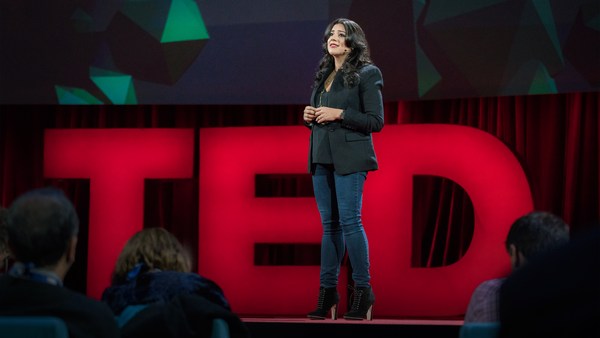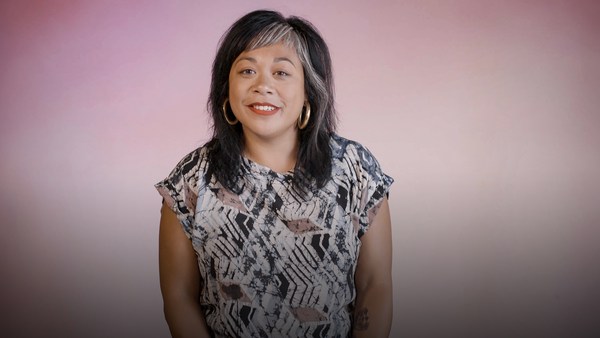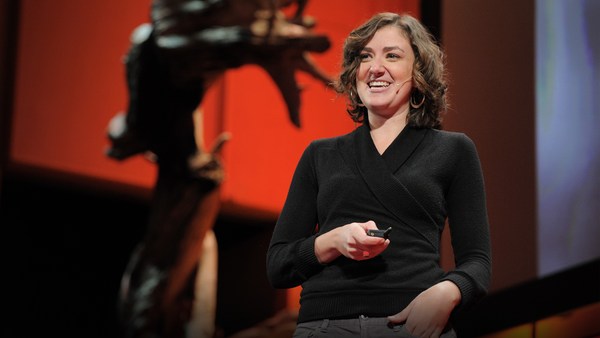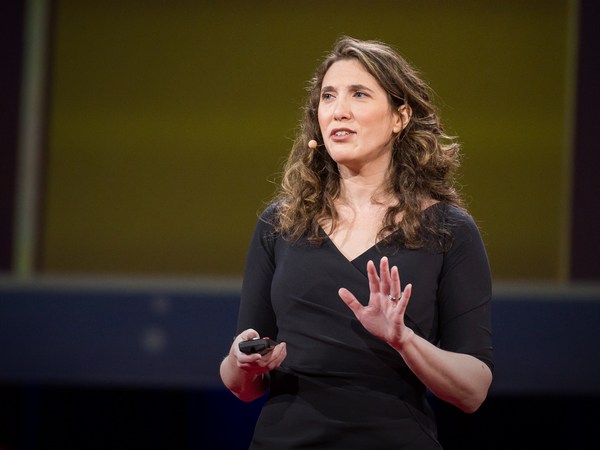I found myself in the pandemic with two little kids, working full time. And Girls Who Code got a Super Bowl ad, I mean, we were on top of the world. And the pandemic hit and I found myself having to go back to work, take care of a newborn homeschool a six-year-old, you know, and save my global nonprofit from being shut down. And I think my entire leadership team was mostly working parents, working moms, and many of us were saying, "Well, when the schools open, everything will be okay." And when the schools didn't open and they came up with this idea of hybrid learning, you just saw millions of women being pushed out of the labor force. So we lost, you know, again, decades of progress in nine months.
And the reason why women had to leave the workforce was because half of our daycare centers were shut down. When you relied on elderly parents to come in and help you with caretaking work, they were no longer there or available because everyone was terrified of this pandemic. You know, for far too long, Americans have always paid more for their childcare than they pay for their mortgage. It is the largest cost center of families. And so when there were no kind of, available centers of care, women, who were already doing two thirds of the caretaking work, had to supplement basically, their paid labor for unpaid labor. And you just, again, saw decades of progress just vanish overnight.
Now, some people thought, well, you know, once the country gets back up on its feet and we open things up, everything will be fine. Well, two years later, men have fully recovered all of their job losses. Women are still missing. And, you know, the latest labor statistics does not account for the amount of women who have downshifted their careers, who have said, "Oh, I'm working full time, I got to work part time now," because, again, half of daycare centers are still shut down. Schools are still kind of inconsistent. We still have a broken structure of care.
And so for me, you know, Girls Who Code, I've been spending 10 years telling girls to like, barnstorm the corner office and lean in real hard and you know, girl-boss their way to the top. And so I bought in to that sentiment, well, if you just worked harder, if you just tried more, you got a mentor, a sponsor, or you learned how to color-code your calendar, like, we would get to equality. And the pandemic taught me that that was all a lie, that I had been focused, that we had been focused on the wrong thing, and that we actually have to stop trying to fix women and fix the structure. And the structures that allow women to work and be a mother have always been broken. We've been the only industrialized nation that doesn't offer paid leave. We've built workplaces around a nine-to-five schedule when schools were open eight to three. We've always been having to balance it all, i.e. having to do it all. And so we were never going to get to equality until we started fixing the structure. And quite frankly, I think the abortion debate is part of that structural conversation. You don't give control over women's ... you know, about their ability how and when to have a child, you take away their ability, quite frankly, to work on their terms.
Whitney Pennington Rodgers: What is the "Marshall Plan for Moms"
and where are we right now with it?
RS: We need the government and the private sector, everybody, quite frankly, to re-imagine women in the workplace. And so when I talk to moms about what it is that they needed, you know, to be able to, again, reconcile those two identities as the caretaker and as a worker, you know, I kind of heard the same thing. And it wasn't not that "Wow." Like, it was obvious. Moms said, you know, “I need paid leave.” We're, like I said, the only industrialized nation that doesn't offer paid leave. Right? Affordable childcare. We don't have it in this country. The average American gets about 500 dollars you know, in childcare benefits. The average, in industrialized nation, parent gets 15,000. So we are woefully under providing support for parents in this country.
School closures. You know, I find that decision so interesting, I want somebody to do, like an investigative report, right? Because, you know, one of the interesting things in America is that we have these things called time and leave studies. So when the policy decision was made to close schools, we had enough time, enough data to say, well, who's doing the homeschooling? Who is this going to affect? What worker is this going to affect? And so we knew, policymakers knew that the ramifications of school closures would dramatically affect women and it wouldn't touch, as it didn't, men's labor. And they did it. Now, other nations across the globe, the UK, other you know, they didn't close the schools. They approached it from a different perspective, right? Or if they closed schools, they had a plan on what they were going to do to support women, to bring them back. And so, school closures were part of this Marshall Plan for Moms. Retraining. Many women found themselves in jobs that were automated because of the pandemic and jobs that weren't going to come back. And so what was the plan to do retraining since we know again, so many women in this country are the breadwinners of their families. So when they lose their job, the entire family suffers.
So that was the Marshall Plan for Moms. We put out a full page ad in "The New York Times" to President Biden saying, "In your first 100 days, as you think about what you should focus on, focus on moms, focus on women." And, you know, that turned into a couple pieces of legislation. Now two years later, Whitney, we haven't passed the Marshall Plan for Moms. And what I mean by that is we haven't passed any of the tenets. We haven't passed paid leave, we haven't passed affordable childcare, and we let the child tax credit expire. So we've bailed out airlines. But we haven’t bailed out moms. And, you know, for me as an activist, as a social entrepreneur, looking at this is devastating, because in many ways, you're waiting for Congress to grow a heart. You know, if there was ever going to be a moment in the history of our country to pass paid leave, for us to see, wow, what would have happened? How many, few[er] millions of people would have died from COVID had they had paid leave, paid sick days? Had we approached this differently. If there was ever a moment for reflection for contemplation for courage, it was now. And we didn't see it from our elected officials.
And the reality is, we can't leave millions of women behind. And so we've really, at Marshall Plan for Moms, turned to the private sector. And I believe in the private sector. You know, when I built Girls Who Code, all of the money we raised was from the private sector. And we ended up teaching half a million kids to code. So the private sector, when it gets its arms around a problem, can really innovate and can really help solve it. And I think the opportunity we have here now, Whitney, is with the great resignation and the fact that there are so many open jobs, it has become a seller's market for employees. And so if there's ever been a moment to say, hey, we need to start providing childcare benefits and maybe even subsidizing people's childcare, that's the way we actually solve it. This is an economic problem, not a personal problem. The moment for that conversation is now.
WPR: Reshma, we have a question here from a TED Member, they ask, "The pandemic has showed that women do an extra shift of work, most of the heavy lifting at home, and upon returning to work, playing the role of the emotional aunt in the workplace. What should allyship look like now in order to support women as we come out of the pandemic?"
RS: Talk about unpaid labor. You know, what about all the unpaid labor women do at work? Who organizes the Christmas party or the Hanukkah party? Or the book clubs or the speakers or the D and I sessions? It’s always women, women of color, and we don’t get paid for that. That's not part of our performance review, that's not part of our compensation package. But we do it. And quite frankly, when we don't do it, we're penalized.
I'll never forget, I was talking to a bunch of CIA agents, CIA agents, and one of them had just had a baby. And she said, "You know, Reshma, that year, I did not organize the office Christmas party. And that was also the year that I -- it was the only year -- I didn't get promoted. And I can't prove it, but I know it was because I didn't plan the Christmas party."
So there's also this expectation when we don't do that unpaid labor at work, that we're not productive, that we're not committed. You know, so I think really having a conversation about how we value that labor is critical.
WPR: One TED Member asks, “If it’s a buyer’s market for employees, what do you think women should ask for first from their employers when it comes to to better benefits? Is there one sticking thing that you think really we should be focusing on?"
RS: So what is happening is, and I think especially in this movement about transparency in pay, I think has really started to really shift some of the gender gap. And so women, I think, are going in and saying, you know, "I want to make more" or "How much are you paying him?" And it's actually translating into higher earnings for them. So I think when it comes to moms, I think three things. So one of the things is we all have to get very clear about what the pay gap is about. Now, the pay gap is not about gender, and it's not even about care work. It's about mothers. The reason why there is a gender gap in pay is the pay gap between mothers and fathers. In fact, the largest pay gap exists between mothers and childless women. And so we have got to, once and for all, close the pay gap. So, for example, if you leave the workforce to have a child or take a break or whatever it is, you lose on average 40 percent of your income. The good news now is that there's algorithms and people that can come in and literally root out the motherhood penalty. So the number one thing is, is when you go in there and you ask, you want to know what he is making. You know what I mean, and you want to make the same or more. I think the second thing is, is we have to start asking for our companies to pay for childcare benefits. The reality is, the childcare business model is broken. You know, we don’t pay childcare -- we pay zookeepers more than we pay childcare workers. And so they don't make enough. Now, that's why they're not coming back to work, and there's so many open childcare positions because the pay is not just, and so we have to figure out -- So the government was supposed to, by creating a ceiling on what you would pay in childcare expenses, was supposed to be able to help close that gap and help families offset the cost. Now, the government, Congress has said sorry, not sorry, not passing the bill, right? So the private sector is the only other institution that can come in here and fix the model. When the private sector starts saying, "OK, we are going to start offering childcare subsidies, backup care, emergency care, we're going to build daycare centers, when they basically take responsibility for fixing the business model, what's going to happen is a lot of entrepreneurs are going to come into the space, and the market is going to become efficient. So this needs to happen.
So I think it's very important for moms, women, allies, everybody to come in and say, "What are your childcare benefits?" We have a study coming out which will show, with McKinsey, probably next week, which will basically prove the case that this is the number one thing that parents want. And this will be a driver of who they work for and who they don't work for. So it makes business sense if you care about attrition, if you care about, again, the four million people that are leaving every month. The way to retain them, the way to win that talent war is to provide childcare. WPR: There’s a question from TED Member Charlotte about a women’s general strike. What do you think about that?
RS: Oh, I love it, the Iceland strike, oh my God, yes. Because, listen, I think that what happened in Iceland essentially is women didn't go to work, they didn't get on a train, they didn't make breakfast for their partners and the entire country shut down. And that year they passed a really progressive law on pay equity and they got more women in elective office. But it was an eye opener for people like, oh, wow, we really can't function, you know what I mean, without women's participation.
WPR: I'm curious what you think is the thing that will ultimately motivate us to actually make it happen. What do you see as the thing that's going to make the tide finally change?
RS: I think we have to build radically different systems. That's why I'm obsessed with the workplace, because I think the workplace is an example of how we have to resist going back to the old normal, because there’s actually alignment. Nobody wants to go back to that old workplace. Not men, not trans people, not, you know, nonbinary, not my people of color, like, nobody, that wasn't working for anybody. You know, that hustle culture, you know that idea that you give everything, you work 80 hours a week and you just like, fall apart, your mental health. I mean, we can't go back to that. You know, we can't go back to that. And so this is our first test. Are we up for building something new collectively, you know, that will serve all of us and will bring us to a place where I think we can all heal and have a little bit more time.
You know, it's very hard to be empathetic and to be brave when you're exhausted. And I think people are really exhausted right now.
I think the second is, I do this, I think we’ve got to keep talking to people who don’t agree with us. You know, my favorite audiences to talk about "Pay Up" are men. And people always say to me, "Well, how do you convince the men?" I'm like, no, the men are with me, with us. We think they're not, but they are. And so it’s everyone’s perspective: "The reason why we don't have these things in this book is because of men." No, it's not because of men. You know what I mean, that's not the problem. It's because of the power and the way that we've traditionally created workplaces. So you also then, when you talk to people who you think are not your allies or who you think may be against you, you sometimes are surprised. I mean, it's the same thing with Girls Who Code, it's like, 40 percent of my teachers are men.
So that's how you build movements. And for me as a social entrepreneur building my second movement, you know, with Marshall Plan for Moms, that is a big lesson that I learned. Is that you can't keep talking to the converted. We've got to convert. [Get access to thought-provoking events you won't want to miss.] [Become a TED Member at ted.com/membership]





